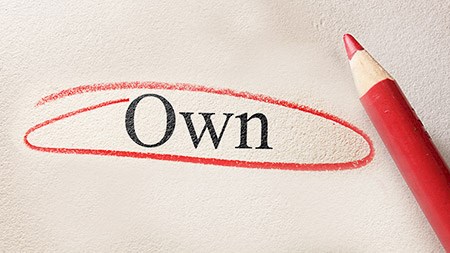The owner is the person in whose name the immovable property is registered in terms of the Deeds Registries Act 47 of 1973.
Instances where you can totally or partly own immovable property, without it being registered in your name
By prescription
This means that you have been in possession of the immovable property, openly and as if you were the owner, for an uninterrupted period of 30 years or more. An example of this is a boundary wall between properties, which was placed incorrectly. The land on your side, which was not originally demarcated as part of your property, can be acquired by prescription. It is unusual, however, for a person to become the owner of a house through prescription.
By expropriation
This means that the owner loses his property to the State. An example of this is where the State expropriates your property in terms of the Expropriation Act 63 of 1975, to build a highway or railway through it, and thereby acquires ownership.
By marriage in community of property
Marriage in community of property means that you and your spouse will have a joint estate. Any property that is registered in your spouse's name makes you the co-owner of the property, although the property is not registered jointly in both spouses' names.
By declaring the registered owner of the property insolvent
In this case, the Master of the High Court will appoint a trustee who will be furnished with the power over the estate (in terms of the Insolvency Act 24 of 1936), including any immovable property that you own. Your rights and obligations as an owner will be taken away from you upon your insolvency, although the property is still registered in your name. You cannot sell or let the property without the written consent of the trustee of your insolvent estate. A person who is insolvent may only buy immovable property with the written consent of the trustee.
Who Can Own Immovable Property?
The parties mentioned below can all be a party to a contract of sale or lease of immovable property, subject to certain requirements:
Minors:
The Children's Act 38 of 2005 deals with matters relating to children's rights, care and protection of children, parental responsibilities, including the rights and responsibilities of unmarried fathers, and other matters such as children's courts, adoption and surrogacy.
Of particular significance is the clarification by the Act of the age of majority. Although the Age of Majority Act, 1972 stipulates the age of 21 as the age of majority, confusion arose from our Constitution and international instruments pertaining to children which defined a child as a person under the age of 18. This confusion has now been resolved by the Children's Act which determines that, as from 1 July 2007, a child becomes a major on reaching the age of 18.
If you marry under the age of 18, you become a major, and remain a major even if you get divorced before your 18th birthday.
A minor over the age of seven can personally enter into any contracts, provided he has the written consent of his guardian.
A guardian can conclude a contract on behalf of his minor, but may not mortgage (bond) any immovable property belonging to the minor, unless authorised to do so by the Master of the High Court (if the property has a value of less than R 100 000.00) or in terms of an Order by the High Court (if the property has a value of more than R 100 000.00).
Unmarried Persons, Widows, Widowers and Divorcees:
Anyone who has never married can enter into a contract of sale or lease, provided he is:
Not a minor (Note the exceptions as mentioned above.);
Not under the influence of alcohol or drugs at the time of conclusion of the contract;
Not insane;
Not prohibited from concluding contracts without the assistance of a curator, in terms of a Court Order; or
Not an unrehabilitated insolvent.
Widows, widowers and divorcees have full contractual capacity. (Note the exceptions as mentioned above.)
Married Persons
All marriages in terms of South African law are In Community of Property, unless an Ante-Nuptial Contract (ANC) is drawn up, making it a Marriage Out of Community of Property.
Marriage out of community of property
Both partners have full contractual capacity. The property can be registered in both spouses' names or in either spouse’s name.
Marriage in community of property
The property must be registered in both spouses' names.
If you were married in community of property prior to 1 November 1984, the husband had what was called 'marital power'. This meant that the husband controlled the spouses' joint estate and the wife was in a similar position to a minor with regard to her contractual capacity.
The Matrimonial Property Act 88 of 1984 abolished the husband's marital power in marriages entered into on or after 1 November 1984.
The General Law Fourth Amendment Act 132 of 1993 amended the position further. In terms of this Act, no marriage in South Africa is subject to the husband's marital power, irrespective of when the marriage was concluded.
It is usual today that spouses married in community of property will have their immovable property registered in the names of both spouses.
Foreign matrimonial property systems
The contractual capacities of persons married in countries other than South Africa, are viewed according to the law of that country.
Tribal marriages
Tribal marriages are not recognised as legal marriages in South Africa, unless a Zulu woman is married in accordance with Section 46 of the Natal Code of Zulu Law, which states that she is unable to conclude a contract without the consent of her husband.
Hindu and Muslim marriages
These marriages are also not recognised as legal marriages in South Africa, unless conducted by a magistrate or commissioner.
This article originally appeared in Property Power 11th Edition Magazine. To order your copy at the discounted price of R120 click here.



